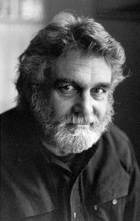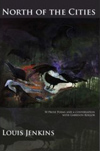 You are a prose poet it says on the front cover of your latest book. What are your feelings toward form and rhyme?
You are a prose poet it says on the front cover of your latest book. What are your feelings toward form and rhyme?
Fine. I like many formal rhymed poems. Some of my best friends have been known to write rhyming poems. I don’t try to stop them. I mean it isn’t for me to judge; it’s their lives… It just isn’t what I want to do. To write a formal poem, a rhymed poem is to call attention to the form, the rhyme, the use of language. In my own writing I want, as much as possible, for the words to disappear, so that the poem becomes something like a movie in the reader’s head. All poems are linguistic constructs, of course, but I don’t want the scaffolding to be apparent. Also, I write in prose because prose is more comfortable for me. I come from a Midwestern working class background and I feel silly trying to write a serious formal poem. It feels like dressing up in an inappropriate outfit— George W. Bush in a flight suit.
Is poetry a spontaneous or premeditated process for you, or somewhere in between?
I wish it were more often spontaneous struck blind on the road to Damascus… but most of the time that vision, that epiphany, whatever you want to call it, doesn’t come, so I just keep writing … When I say epiphany I don’t want to sound too grandiose, but no poem makes it, I think, without that little moment of insight that takes you for an instant beyond the humdrum. That moment can’t be willed. You can only be ready for it when it comes along.
How do you write the ending to a poem? In other words, do you know the end at the beginning?
I have no idea where I am in a poem when I start out, whether the phrase, or fragment of an idea that I have in my head is the beginning, the middle or the end, or if it is a mirage— no poem at all. I really don’t want to know in advance, I want to be open to all possibilities. Robert Frost said, “No surprise in the writer, no surprise in the reader.” So I just tramp along through the tulgey wood seeing where the path will take me.
Where would you say your poetry falls on a continuum of optimism and pessimism?
I think that all poetry is essentially optimistic in that to write a poem is a “creative” act, therefore life affirming. A poem, a good poem, takes some of the chaos of life and orders it, contains it for a moment.
The poem strikes a note or a cord, when it works, with which the reader vibrates sympathetically. It is a positive force.
To write a poem requires a great deal of optimism: to believe that you have something to say and that someone, somewhere, wants to hear what you have to say, and to believe that somehow that will make some kind of unspecified difference.
What are you working on currently? Is there a new book in the works?
There is always a new book in the works. I don’t know yet what shape it will take. I recently spent some time in Europe so I have been writing about that. Then, every once in a while, one of these prose poems comes along.
Louis Jenkins was born in Oklahoma. Since 1970 he has lived in Duluth, Minnesota and has been writing volumes of poetry including: Sea Smoke, The Winter Road (2000), Just Above Water (1997) and Nice Fish (1995) all published by Holy Cow Press. His most recent work is North of the Cities (Will o’ the Wisp Books, 2007).
 North of the Cities
North of the Cities